5 Books That Changed the Way I Thought About Writing – GUEST POST by Salinee Goldenberg (THE LAST PHI HUNTER)
Today, we’re joined by Salinee Goldenberg!
To celebrate the release of her debut novel The Last Phi Hunter, out this week from Angry Robot, Salinee has written a guest post exploring the five books that have impacted her writing.
Before we find out which five they are, let’s find out more about Salinee’s own book, The Last Phi Hunter:
Ex, the youngest member of the Phi Hunters Order, has spent his life slaying the ghosts and demons of Suyoram Kingdom. While he takes great pride in his mystical trade, collecting dwindling bounties and peddling butchered spirit organs lacks the glory he craves. He’s determined to hunt down Shar-Ala, a demon of nightmares, of madness – who has eluded even Ex’s masters.
In a provincial village along the way, Arinya, a charming muay-boran champion, manages to save Ex him from a brutal ass-kicking, despite being nine months pregnant. In return, she asks him to escort her through the dangerous, spirit-filled forest, where ghosts salivate over the scent of the unborn. Feeling responsible for Arinya’s safety, Ex vows to help her return home. But as more of Arinya’s secrets emerge, and the elusive demon nears, Ex must face dangers from both men and monsters, or lose not only the respect and sanctuary of his guild, but also the woman he’s trying not to fall in love with.
The Last Phi Hunter is a mythic dark fantasy, equal parts smart, exhilarating, and delightfully fun.
File Under: Fantasy [ Ex Marks the Spot | Baby Brain | Phi Fi Fo Fum | Eye See You ]
The Last Phi Hunter is out today from Angry Robot. You can order your copy on Bookshop.org
Check out our Twitter page from 4pm 9th April for our giveaway – you could win a copy of The Last Phi Hunter!
5 Books That Changed the Way I Thought About Writing
by Salinee Goldenberg
Every author has a long list of their favorite novels, but on that list there’s always a few titles with asterisks next to them. These are the stories that remain long after the last sentence, and color the way we see the world just a bit. These are the ones that whisper inspiration from the depths of your subconscious when you dig down to create your own art.
Usually, a book will make such an impact when it appears at just the right moment in your life. Sometimes they help you through a dark place, or put into words something you’ve always felt but never knew how to say. So I thought back to those moments, and identified the authors that not only profoundly affected me at a young age, but whose words continued to echo throughout the years, and especially resonated when I started thinking about my own journey as a writer.
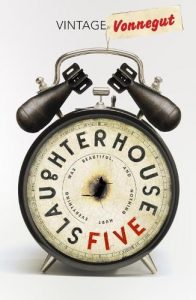 Slaughterhouse Five – by Kurt Vonnegut
Slaughterhouse Five – by Kurt Vonnegut
I first read SlaughterHouse Five after I’d recently been discharged from the hospital for a wee lil bout of psychosis, (it happens every so often with Bipolar disorder) and when I read “Billy Pilgrim has become unstuck in time,” the chills and paranoia struck immediately. Somehow, I felt seen by this World War II P.O.W and his depiction of PTSD before the word was even coined, despite our identities and experiences being about as far apart as you could get. The initial hook was in before I even comprehended what it was really about, and then proceeded to be stunned by how Vonnegut so effortlessly drops deep, raw insight with irony—snapshot paragraph long chapters and quiet character moments threaded with scifi plotlines that are absolutely bonkers.
All that, and it was really easy to read. I’d been self-conscious about seeing that type of feedback on critiques of my own writing. But “accessible” doesn’t mean “dumbed down.” It means a novel makes no presumptions on who their reader is or how far they got in college. You can still write beautiful, meaningful stories for adults at a fourth grade reading level.
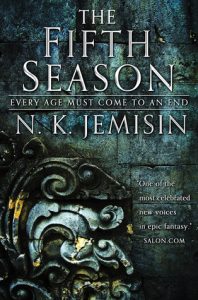 The Fifth Season by N.K Jemisin
The Fifth Season by N.K Jemisin
There was the before times, and then there was the Fifth Season. Cheating slightly, since I’m too old to have been that young when I first read Jemisin, but it was close to the time when I started to become interested in pursuing writing as an actual career. I’d been turned off from fantasy for a while, but with Jemisin’s books, her unconventional viewpoint shifts, the twists and turns, her mastery of world building and deep magic systems—it changed the way I viewed the genre. It had felt so narrowed to a western lens for such a long time, reduced to a sort of European medieval ideal, but with her work, I was into magic again. It reassured me that people craved fresh, new perspectives, and I shouldn’t shirk away from diverting from the norm.
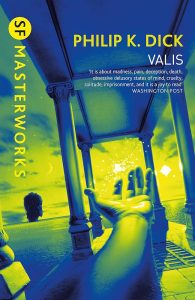 V.A.L.I.S – by Philip K Dick
V.A.L.I.S – by Philip K Dick
Along with his better novels like Do Androids Dream, Radio Free Albamuth, and Man in the High Castle, PKD was my introduction to weird science fiction. His characters might be famously wooden, but the concepts he explored were always thought-provoking. For whatever reason, it hadn’t occurred to me before then how so many authors suffered from mental illness, but that was impossible to ignore with V.A.L.I.S, and the author-insert’s descent into madness. This realization, though sad, was reassuring to another struggling, neurodivergent artist.
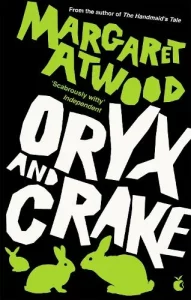 Oryx and Crake by Margaret Atwood
Oryx and Crake by Margaret Atwood
Oryx and Crake was one of the first dystopian novels I read that wasn’t completely bleak. Some scenes in the late-stage capitalist nightmare of Year of the Flood had me dying—Atwood brings a playfulness to some of her writing that can make serious, disturbing topics so much fun to explore. There aren’t many who are better at dystopia, and I love how her background in poetry elevates her voice.
At some point, I must have thought that my own writing needed to be literary to be taken seriously, and maybe it was because I admired Margaret Atwood so much and didn’t yet have a grasp on nuance. But trying to poeticize my prose sucked all the fun out of my stories. Once I started putting jokes back in, the lighthearted, ironic moments that had me snickering, the fun returned. Yet another lesson learned to the tune of: don’t bother trying to write like anyone else, and stop taking yourself so damn seriously.
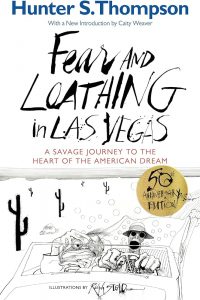 Fear and Loathing in Las Vegas by Hunter S. Thompson
Fear and Loathing in Las Vegas by Hunter S. Thompson
To me, Hunter S. Thompson embodies all that is glorious about style. This “savage journey to the heart of the American Dream” is not technically speculative fiction, but there’s a surrealist element to the outlandish plot and drug-addled narration that becomes a kind of rock and roll magic. When I first read it in highschool, I wrote “Drive through Death Valley in a red convertible with a suitcase full of drugs” on my bucket list, next to “get a job I don’t hate.” Years later, I did drive through Death Valley in a red convertible, however I was stone cold sober and had a job I hated. It was terrible. I learned that imitation is a fruitless journey.
Many more years later, when I went looking for debut author advice, I kept being told “Build an Audience!” and “Develop Your Brand!” I realized I didn’t want to do any of that, and got a bit down on myself for it. And then I thought, What Would Hunter S Thompson Do? Certainly not spend hours stressing about making trending Tiktok posts or forcing himself to “engage with his target demographic.” He was completely himself in art and life, and never pretended to be anything else.
In general, that’s what I believe all these authors were trying to tell me, from different genres and narratives and decades, from different walks of life. Stay true to yourself, because no one sees the world like you do, and we all want to hear about it.
The Last Phi Hunter is out today from Angry Robot. You can order your copy on Bookshop.org
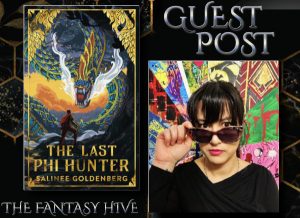

[…] found this quote at Fantasy Hive, in which the author describes her influences for the book and the approach she’s seeking in […]
[…] It’s just the start, I’ve gffot a lot more in the tank, trust.GUEST POSTS AND PRESS:Fantasy Hive – 5 Books that Changed the Way I Thought about WritingFriends Talking Fantasy Podcast InterviewMy Favoite Bit on MRK’s BlogReview on the British […]